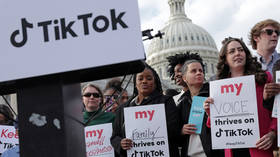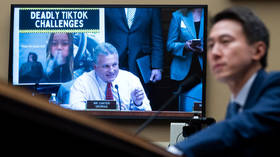The Orwellian RESTRICT Act is a chilling echo of ‘1984’ and an erosion of American freedom

In an eerie semblance to George Orwell's '1984', the Restricting the Emergence of Security Threats that Risk Information and Communications Technology Act, or RESTRICT Act, looms as a dark cloud over American liberties.
Branded as a mere "TikTok ban," this act possesses a sweeping reach that would empower the federal government to designate any nation a "foreign adversary," ban online services and products even indirectly controlled by an entity within their jurisdiction, and severely punish Americans who engage in almost any transaction with them.
Sponsored by Sen. Mark Warner (D-VA), the RESTRICT Act not only targets the Chinese-linked TikTok platform but also has the potential to dismantle the very foundations of American freedom. One cannot help but draw comparisons to Orwell's dystopian masterpiece, where pervasive government surveillance and control are the norm. In a frightening twist, this proposed legislation could make such nightmarish fiction a stark reality.
The chilling provisions of the RESTRICT Act would impose a civil penalty of up to $250,000 by the Secretary of Commerce on individuals who conduct transactions that violate the act. The bill's definition of a transaction is disturbingly broad, encompassing activities such as acquisitions, importation, data transmission, software updates, repairs, data hosting services, and other transactions designed to evade or circumvent the act's application.
However, as in the oppressive world of '1984', the $250,000 fine is only the beginning. American citizens found to be in violation of the act could face a criminal fine of up to $1 million and a jail sentence of up to 20 years.
The parallels to Orwell's vision are striking, as the RESTRICT Act essentially serves as a tool of control and punishment. It is a sobering reminder of the dystopian fate that awaits the public if it allows government unchecked power in the name of security from foreign nations.
Moreover, the bill allows the federal government to seize and access various devices and services belonging to American citizens, including phones and computers, internet access points, e-commerce technology and services, cryptocurrencies, and even advanced technologies like quantum computing, post-quantum cryptography, advanced robotics, and biotechnology.
To add insult to injury, the government is granted immunity from public oversight by restricting Freedom of Information Act (FOIA) requests related to the enforcement of the bill. In this regard, the RESTRICT Act resembles an American version of China's "Great Firewall," which isolates its citizens from a significant portion of the World Wide Web.
However, unlike in China, where VPN usage does not automatically lead to imprisonment and many citizens use it to access popular apps and video games without repercussions, the RESTRICT Act imposes much more severe penalties on those who violate its provisions.
Already, conservatives are sounding the alarm on the dangers of the bill, including Tucker Carlson, who dedicated a monologue warning that it would provide the government the ability to “punish American citizens and regulate how they communicate on the Internet.”
Donald Trump Jr. wrote on Twitter: “Nothing is ever as it seems. The uniparty wants more power to control what we do and see. And now we’re going to give the Biden goons the ability to throw us in jail for 20 years if they decide we’re in violation of this craziness? No thanks.”
The US House Committee on Financial Services issued a warning to other members of the Republican party to reject the bill, stating that the RESTRICT Act “is using TikTok as a smokescreen for the largest expansion of executive power since IEEPA."
“The US can’t beat China by becoming more like the Chinese Communist Party,” it added.
It remains to be seen whether Americans will be able to wake up to the dystopian reality that looms just beyond the horizon should the ratification of the RESTRICT Act proceed. For their sake, and everyone else’s, let’s hope so.
The statements, views and opinions expressed in this column are solely those of the author and do not necessarily represent those of RT.















